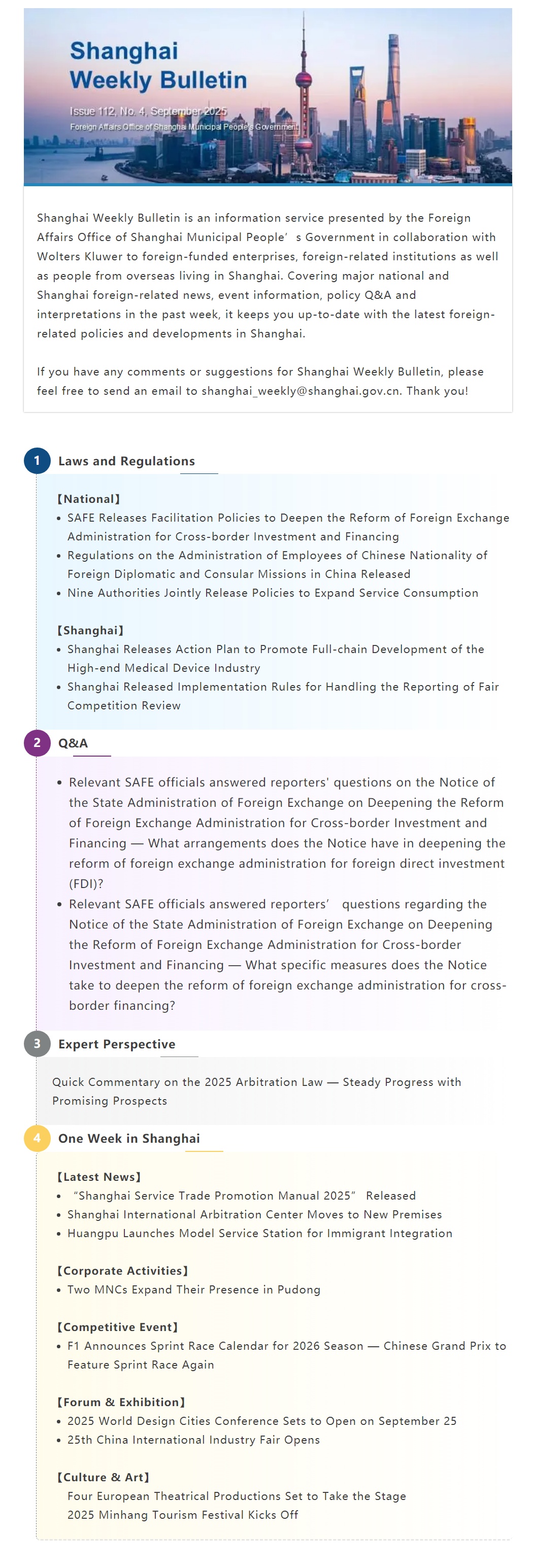Shanghai Weekly Bulletin (Issue 112 No.4, September 2025) ( 2025.09.24 )

Laws and Regulations
National
1. SAFE Releases Facilitation Policies to Deepen the Reform of Foreign Exchange Administration for Cross-border Investment and Financing
[Keywords: Cross-border, Investment and financing]
The State Administration of Foreign Exchange (SAFE) recently released the Notice on Matters Concerning Deepening the Reform of Foreign Exchange Administration for Cross-border Investment and Financing. The document introduces a package of facilitation measures, including four reform initiatives on foreign exchange management for cross-border investment, two reform initiatives on foreign exchange management for cross-border financing, and three policies to optimize the facilitation of income and payment under capital account.
Source: SAFE
2. Regulations on the Administration of Employees of Chinese Nationality of Foreign Diplomatic and Consular Missions in China Released
[Keywords: Diplomatic and consular missions, Employees of Chinese nationality]
Recently, the Regulations on the Administration of Employees of Chinese Nationality of Foreign Diplomatic and Consular Missions in China were officially released. The document stipulates that foreign diplomatic and consular missions in China shall publish job vacancy information through the human resources platform established by the Ministry of Foreign Affairs and may hire people of Chinese nationality based on actual needs. These regulations will take effect on January 1, 2026.
Source: Website of the Chinese Government
https://www.gov.cn/zhengce/content/202509/content_7040749.htm
3. Nine Authorities Jointly Release Policies to Expand Service Consumption
[Keywords: Service consumption]
Recently, the Ministry of Commerce, together with eight other authorities, released the Several Policies and Measures on Expanding Service Consumption. The document sets out 19 specific measures in five areas, namely, develop platforms to promote service consumption, enrich the supply of high-quality services, stimulate new growth in service consumption, strengthen fiscal and financial support, and improve statistical monitoring systems.
Source: Ministry of Commerce
https://fms.mofcom.gov.cn/zcfg/art/2025/art_50157c02dc6e4d30bef19cf93a3adc05.html
Shanghai
1. Shanghai Releases Action Plan to Promote Full-chain Development of the High-end Medical Device Industry
[Keywords: Medical devices]
Recently, the General Office of the Shanghai Municipal People’s Government released the Action Plan for Promoting the Full-chain Development of the High-end Medical Device Industry in Shanghai. The document identifies eight categories of key products and outlines 20 major tasks across seven areas, with the goal of building Shanghai into a highland for the high-end medical device industry with greater global influence.
Source: International Services Shanghai
https://english.shanghai.gov.cn/en-Policies/20250917/36d527e38a7e4822b5c790671232ce06.html
2. Shanghai Released Implementation Rules for Handling the Reporting of Fair Competition Review
[Keywords: Fair competition review, Reports]
Recently, the Shanghai Municipal Administration for Market Regulation released the Implementation Rules for Handling the Reporting of Fair Competition Review in Shanghai. The document specifies circumstances under which the reporting of fair competition review will not be processed, circumstances where the procedures for fair competition review are not performed or are performed irregularly, and circumstances involving violations of fair competition review standards. The document came into effect as of the date of release.
Source: Shanghai Municipal Administration for Market Regulation
https://scjgj.sh.gov.cn/919/20250912/2c984ad6992704e901993b8a4a675205.html
Q&A
Relevant SAFE officials answered reporters' questions on the Notice of the State Administration of Foreign Exchange on Deepening the Reform of Foreign Exchange Administration for Cross-border Investment and Financing
Q1
What arrangements does the Notice have in deepening the reform of foreign exchange administration for foreign direct investment (FDI)?
A1
Firstly, the Notice has abolished basic-information registration for preliminary expenses under FDI. If overseas investors need to remit preliminary expenses before establishing an FDI enterprise in China, they may open the relevant account and remit the funds directly.
Secondly, the Notice has eliminated registration requirements for domestic reinvestment by FDI enterprises. When FDI enterprises use foreign exchange capital and RMB funds obtained from foreign exchange settlement to carry out domestic reinvestment, the invested enterprises or equity transferors are not required to complete registration for receiving domestic reinvestment. The relevant funds may be directly transferred to the designated accounts. This policy has been piloted in certain provinces and cities with positive results and is now being rolled out nationwide.
Thirdly, the Notice allows reinvestment in China of foreign exchange-denominated profits under FDI. It clarifies that foreign exchange-denominated profits legally generated in China by FDI enterprises, as well as foreign exchange profits lawfully obtained by overseas investors, may be reinvested domestically.
Fourthly, the Notice facilitates the attraction and use of foreign capital by non-enterprise scientific research institutions. It is clarified that when domestic non-enterprise scientific research institutions receive overseas funds, they shall follow the same registration and foreign exchange settlement procedures as FDI enterprises. This measure was previously piloted under the “Ke-Hui-Tong” scheme in certain provinces and cities and is now being extended nationwide.
Relevant SAFE officials answered reporters’ questions regarding the Notice of the State Administration of Foreign Exchange on Deepening the Reform of Foreign Exchange Administration for Cross-border Investment and Financing
Q2
What specific measures does the Notice take to deepen the reform of foreign exchange administration for cross-border financing?
A2
First, the Notice expands cross-border financing facilitation for sci-tech innovative enterprises. The facilitation quota for cross-border financing by high-tech small and medium-sized enterprises (SMEs), “specialized, sophisticated, distinctive, and innovative” SMEs and technology-based SMEs across the country will be uniformly raised to the equivalent of USD 10 million. For certain eligible enterprises selected under the “Innovation Credit Scheme”, the facilitation quota will be further increased to the equivalent of USD 20 million.
Second, the Notice simplifies the contract signing registration requirements for enterprises participating in cross-border financing facilitation businesses. Relevant enterprises are no longer required to provide audited financial reports of the previous year or the most recent period during the contract signing registration process.
Source: SAFE
Expert Perspective
Quick Commentary on the 2025 Arbitration Law — Steady Progress with Promising Prospects
By He Junming (Shanghai United Law Firm)
The long-anticipated Arbitration Law of the People’s Republic of China (the “2025 Arbitration Law”) was officially revised and adopted at the 17th session of the Standing Committee of the 14th National People’s Congress on September 12, 2025. The author offers a brief commentary to share some initial insights and reflections.
I. Highlights of the Revision
The revised 2025 Arbitration Law consists of 8 chapters and 96 articles, compared with the draft amendment of 8 chapters and 91 articles. Upon a comprehensive review of the text, the author is of the view that, in contrast with the Current Arbitration Law — which has only undergone two minor amendments in 2007 and 2009 — the 2025 Arbitration Law stands out in four key respects: internationalization, standardization, equalization, and digitalization.
(I) Comprehensive Enhancement of the Internationalization of China’s Commercial Arbitration System
The most notable highlight of the 2025 Arbitration Law lies in its advances in internationalization, which are both comprehensive and far-reaching. Specifically, these are reflected in the following five areas:
- It adopts the “seat of arbitration” as the criterion for determining the nationality of an arbitral award, which not only resolves a long-standing controversy once and for all, but also strengthens alignment with international treaties and the UNCITRAL Model Law.
Article 81 of the 2025 Arbitration Law formally introduces, for the first time in statutory form, the concept of the “seat of arbitration”. It directly addresses a long-standing issue in China’s arbitration practice — whether the nationality of an arbitral award should be determined by the seat of arbitration or by the location of the arbitral institution. Article 81 makes it explicit that the seat of arbitration governs the nationality of an award, the jurisdiction of judicial review, and the applicable procedural law. On top of this, Article 81 further clarifies that, in the absence of an agreement between the parties, the arbitral tribunal shall determine the seat “in accordance with the principle of facilitating dispute resolution”. In addition, in line with this change, Article 82 requires that the seat of arbitration be filed with arbitration association in the case of ad hoc (special) arbitration, while Article 87 provides explicit recommendations for the preferred selection of the seat.
The significance of this amendment can be understood from both domestic and international perspectives. From the perspective of China’s domestic legal framework, the Current Arbitration Law has long lacked the concept of the “seat of arbitration”, recognizing only the location of the arbitral institution. The absence of this concept gave rise to controversies such as in the case Longlide Packaging & Printing Co., Ltd. v. BP AgnatiS.r.l. which concerns the validity of an arbitration agreement arbitrated by a foreign institution in the Chinese mainland, and in the Brandwood Industries, Inc. (USA) case, which concerns whether a foreign arbitral award rendered in the Chinese mainland by a foreign arbitral institution should be deemed a Chinese award.
In the past, apart from court judgments, these issues were mainly resolved through indirect responses in laws such as the Civil Procedure Law of the People’s Republic of China, as well as direct clarifications in judicial documents such as the Minutes of the National Symposium on the Foreign-related Commercial and Maritime Trial Work of Courts (2022). However, such approaches remained imperfect. Strictly speaking, from the perspective of the hierarchy of norms within the legal system and the relationship between general and special rules, the answers to the above disputes had always been somewhat inadequate. The amendment brought by the 2025 Arbitration Law resolves, in one stroke, the long-standing challenge of identifying the “nationality of awards” that has perplexed Chinese courts. It affirms and builds upon past judicial practice, while completing an essential part of the internal legal framework.
From the perspective of alignment with the international legal framework, Article 1(1) of the Convention on the Recognition and Enforcement of Foreign Arbitral Awards (the “New York Convention”) stipulates: “This Convention shall apply to the recognition and enforcement of arbitral awards made in the territory of a State other than the State where the recognition and enforcement of such awards are sought. It shall also apply to arbitral awards not considered as domestic awards in the State where their recognition and enforcement are sought.” This means that, when determining whether Chinese courts have obligations under the New York Convention with respect to a given award, the first consideration must be the nationality of the award. As such, the issue of nationality has long been a key point for foreign parties in assessing whether an award can be recognized and enforced in China. Furthermore, both Article 1(3) and Article 20 of the UNCITRAL Model Law on International Commercial Arbitration (the “UNCITRAL Model Law”) expressly provide for the concept of the seat of arbitration. The amendment brought by the 2025 Arbitration Law directly aligns with these provisions of the UNCITRAL Model Law. This alignment enables foreign parties, drawing on their understanding and confidence in the New York Convention and the UNCITRAL Model Law, to better understand and accept China’s arbitration legal framework.
[To be Continued]
One Week in Shanghai
Latest News
1. “Shanghai Service Trade Promotion Manual 2025” Released
[Keywords: Service trade promotion]

Recently, the Shanghai Service Trade Promotion Manual 2025 was officially released at the 2025 China International Fair for Trade in Services (CIFTIS). The document features eight national-level characteristic service export bases, sixteen district-level innovative trade-in-service practice cases, as well as two digital trade cases, i.e., the Lingang International Data Economy Industrial Park and the Shanghai Data Exchange.
Source: Shanghai Commerce
Source: Manual Download Link
https://sww.sh.gov.cn/cmsres/7a/7a1dd3b3b9014222a26563ece7ad0af1/c52c6c2d6a83374afced369efeaa4748.pdf
2. Shanghai International Arbitration Center Moves to New Premises
[Keywords: Shanghai International Arbitration Center]
The Shanghai International Economic and Trade Arbitration Commission (Shanghai International Arbitration Center) relocated to its new office premises on September 22. The new premises are located on the 12th to 15th floors of Tower T2, Pacific Xintiandi, 288 South Xizang Road, Huangpu District, Shanghai. The former office premises of the Shanghai International Arbitration Center and its previous office and hearing facilities in Qiantan, Pudong, will no longer handle arbitration-related business.
Source: Shanghai Municipal Bureau of Justice
3. Huangpu Launches Model Service Station for Immigrant Integration
[Keywords: Model service station for immigrant integration]
Recently, Huangpu District has further upgraded its immigrant integration services in Huaihai Middle Road Subdistrict, with the establishment of a “Model Service Station for Immigrant Integration”. The station currently offers 14 services in three categories frequently needed by both Chinese and foreign residents, covering immigration and exit-entry administration, traffic management, and public security.
The service model combines on-site consultation, online appointment, and streamlined processing, while also introducing the “One-stop Online Service” self-service terminal. These measures are designed to significantly improve efficiency and convenience for residents in handling official matters and integrating into community life.
Source: Shanghai Huangpu
Corporate Activities
1. Two MNCs Expand Their Presence in Pudong
[Keywords: Bayer, Cummins]
Recently, two multinational companies (MNCs) in Pudong announced major new initiatives. Bayer Co.Lab has launched its first platform for global life sciences incubator network — the Bayer Co.LabAdVenture, which aims to connect venture capital partners globally. Meanwhile, the new site of Cummins China Global Distribution Center was inaugurated in Pudong, together with the simultaneous establishment of its OEM Parts Export Support Center and Supply Chain Solutions Design Center.
Source: Pudong Release
Competitive Event
1. F1 Announces Sprint Race Calendar for 2026 Season — Chinese Grand Prix to Feature Sprint Race Again
[Keyword: F1]
Recently, Formula 1 and the Fédération Internationale de l'Automobile (FIA) officially announced the six sprint race venues for the 2026 season. The races will be held at the Chinese Grand Prix (March 13–15), Miami Grand Prix (May 1–3), Canadian Grand Prix (May 22–24), British Grand Prix (July 3–5), Dutch Grand Prix (August 21–23), and Singapore Grand Prix (October 9–11).
Source: Shanghai Jiading
Forum & Exhibition
1. 2025 World Design Cities Conference Sets to Open on September 25
[Keywords: World Design Cities Conference]

The 2025 World Design Cities Conference (WDCC) will be held from September 25 to 28, with the main venue located in Huangpu District. Under the theme of “Design Boosts Flourishing”, the conference will uphold its mission and vision of “building a global platform for design innovation and cooperation and exploring new pathways for design-driven high-quality development”. It aims to serve as a trendsetter in ecological design, a new paradigm for stylish living, and a source of industrial innovation.
Source: International Services Shanghai
https://english.shanghai.gov.cn/en-Events/20250917/9239246aebd9498a96d3e6cad17849b2.html
2. 25th China International Industry Fair Opens
[Keyword: CIIF]
On September 23, the 25th China International Industry Fair (CIIF) officially opened. This year’s CIIF is themed “Industrial Innovation, Smart Manufacturing Without Boundaries”. It introduces an innovative “1+3+9+10” framework — one high-standard opening ceremony, three special exhibitions including the National New industrialization and “14th Five-Year Plan” Major Industrial Achievements Exhibition, the Smart Elderly-care Service Robots Exhibition, and the Future Industry Innovation Exhibition; nine industry-themed exhibitions; and more than ten high-standard forum events.
Source: Shanghai Release
Culture & Art
1. Four European Theatrical Productions Set to Take the Stage
[Keywords: Europe, Theatre]

From September to October, four outstanding productions from Europe will be presented at the 2025 ACT Shanghai International Theatre Festival. The lineup includes two French plays, Le Souffleur and L’ Homme et le Pêcheur; the Belgian multimedia production Du Bout Des Doigts; and the British physical theatre work Charlie & Stan.
Source: Shanghai Tourism
2. 2025 Minhang Tourism Festival Kicks Off
[Keywords: Minhang Tourism Festival]
The 2025 Minhang Tourism Festival, together with the inaugural Meilong Trendy Food and Fun Festival, has recently kicked off at Shanghai Libo. Staying true to its mission of being “a festival for the people”, this year’s event features 42 festive activities across five categories: 12 in City Tour, 9 in Shopping Tour, 9 in Cultural and Museum Tour, 7 in Rural Fun Tour, and 5 in Traditional Chinese Style Trendy Tour. The festival will run until October 6.
Source: Shanghai Tourism